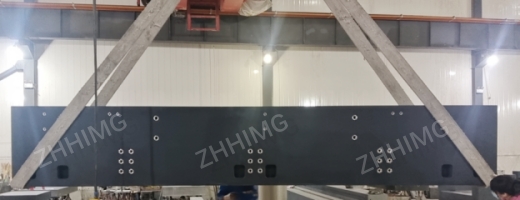The Role of Granite in Enhancing the Dynamic Performance of Machine Tools through Mineral Casting Beds
Granite, a natural stone known for its durability and stability, has found a significant application in the realm of machine tools through the innovative use of mineral casting beds. This article delves into the specific mechanism by which mineral casting beds, incorporating granite, improve the dynamic performance of machine tools and the subsequent impact on overall performance and machining efficiency.
Mechanism of Mineral Casting Beds
Mineral casting beds, also known as polymer concrete, are composed of a mixture of granite aggregates and a polymer resin binder. The primary mechanism by which these beds enhance the dynamic performance of machine tools lies in their superior damping properties. Granite, with its high density and inherent vibration-damping characteristics, significantly reduces the amplitude of vibrations during machining operations. When combined with a polymer resin, the resulting composite material exhibits even greater damping capacity compared to traditional metal-based machine tool beds.
The process begins with the selection of high-quality granite aggregates, which are then mixed with a polymer resin to form a slurry. This mixture is poured into molds and allowed to cure, resulting in a rigid and stable structure. The cured mineral casting bed provides a solid foundation that minimizes vibrations and enhances the precision of the machine tool.
Impact on Performance and Efficiency
The incorporation of granite-based mineral casting beds in machine tools has a profound impact on their overall performance and machining efficiency. The enhanced damping properties lead to several key benefits:
1. Improved Precision: Reduced vibrations result in higher machining accuracy, allowing for the production of components with tighter tolerances.
2. Extended Tool Life: Lower vibration levels decrease the wear and tear on cutting tools, extending their lifespan and reducing the frequency of tool changes.
3. Increased Machining Speed: With better vibration control, machine tools can operate at higher speeds without compromising accuracy, leading to increased productivity.
4. Enhanced Surface Finish: The stability provided by mineral casting beds results in smoother surface finishes on machined parts, reducing the need for secondary finishing operations.
In conclusion, the use of granite in mineral casting beds significantly enhances the dynamic performance of machine tools. By improving vibration damping, these beds contribute to higher precision, extended tool life, increased machining speed, and better surface finishes. Consequently, the overall performance and machining efficiency of machine tools are markedly improved, making mineral casting beds a valuable innovation in the manufacturing industry.
Post time: Sep-14-2024

